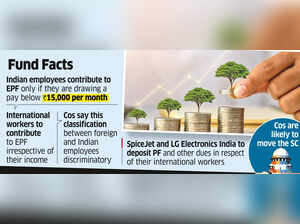Business
Delhi High Court Rules Expatriates Must Join EPFO Fund

Expatriates working in Indian companies must now join the Employees’ Provident Fund Organisation (EPFO) and contribute to the fund, regardless of their earnings. This decision was made by the Delhi High Court on October 10, 2023, marking a significant change in policy regarding international workers in India.
The court upheld the constitutional validity of amendments to the Employees Provident Funds and Miscellaneous Provisions Act 1952, as well as notifications from the Indian government issued in 2008 and 2010. These regulations require foreign employees of Indian firms to contribute to the Employees’ Provident Fund (EPF). The ruling specifies that expatriates can withdraw the entirety of their EPF contributions only upon retirement after reaching the age of 58 years, or if they become permanently incapacitated due to health issues.
This ruling is seen as a setback for many expatriates, particularly those who come to work in India for shorter periods, typically between two to five years. In contrast, Indian employees are obligated to contribute to the EPF only if their monthly salary is below ₹15,000. Legal experts have pointed out that many foreign employees leave India shortly after their contracts end, which raises questions about the equity of this requirement, especially since their contributions will also need to be covered by their employers.
The division bench, comprising Chief Justice Devendra Kumar Upadhyaya and Justice Tushar Rao Gedela, found the differentiation between expatriates and domestic employees reasonable. The court stated that while domestic workers contribute throughout their employment, international workers’ contributions are limited to their short stays in the country. This classification aims to provide social security without imposing undue financial burdens on expatriates throughout their employment.
In their ruling, the High Court upheld EPFO directives that mandated companies like SpiceJet and LG Electronics India to deposit the provident fund dues for their international employees. The court dismissed SpiceJet’s petition challenging an EPFO summons from 2012, which required the airline to present evidence and records related to the provident fund dues owed for its foreign workers. A similar case against LG Electronics was also rejected.
While the Delhi High Court’s verdict aligns with a previous ruling from the Bombay High Court, it contrasts with a decision by the Karnataka High Court, creating a legal divergence that is likely to escalate to the Supreme Court for a definitive interpretation. Both SpiceJet and LG Electronics are reportedly considering appealing the decision to the Supreme Court.
Legal representatives, including Atul Sharma, counsel for SpiceJet, argue that the classification between foreign and Indian workers is discriminatory. Sharma contends that the basis for the amendments stems from international treaties regarding social security that have not been ratified by the Indian Parliament, thus complicating the legal justification for the ruling.
As this situation evolves, the implications for expatriates and their employers in India remain significant, with potential changes to the regulatory landscape on the horizon.
-

 World4 months ago
World4 months agoSBI Announces QIP Floor Price at ₹811.05 Per Share
-

 Lifestyle4 months ago
Lifestyle4 months agoCept Unveils ₹3.1 Crore Urban Mobility Plan for Sustainable Growth
-

 Science3 months ago
Science3 months agoNew Blood Group Discovered in South Indian Woman at Rotary Centre
-

 World4 months ago
World4 months agoTorrential Rains Cause Flash Flooding in New York and New Jersey
-

 Sports3 months ago
Sports3 months agoBroad Advocates for Bowling Change Ahead of Final Test Against India
-

 Top Stories4 months ago
Top Stories4 months agoKonkani Cultural Organisation to Host Pearl Jubilee in Abu Dhabi
-

 Science4 months ago
Science4 months agoNothing Headphone 1 Review: A Bold Contender in Audio Design
-

 Top Stories4 months ago
Top Stories4 months agoAir India Crash Investigation Highlights Boeing Fuel Switch Concerns
-

 Sports3 months ago
Sports3 months agoCristian Totti Retires at 19: Pressure of Fame Takes Toll
-

 Business4 months ago
Business4 months agoIndian Stock Market Rebounds: Sensex and Nifty Rise After Four-Day Decline
-

 Politics4 months ago
Politics4 months agoAbandoned Doberman Finds New Home After Journey to Prague
-

 Top Stories4 months ago
Top Stories4 months agoPatna Bank Manager Abhishek Varun Found Dead in Well









